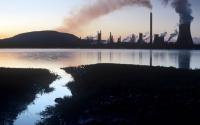19 September 2007Lewis Smith
Climate change is so far advanced that serious damage to the environment is inevitable, scientists told a conference yesterday.
Action to limit the impact can only make the difference between moderate and severe damage rather than preventing it altogether. Scientists who a decade ago were warning that climate change would first be felt significantly by their grandchildren said they expected it to have a major impact within their own lifetimes.
Some regions of the world, however, could reap benefits, particularly Britain, which faces the prospect of better harvests and higher wheat yields. Scientists at the opening of the two-day conference in London cautioned that time to limit the effects of rising temperatures was running out. Just eight years are left for the world’s carbon dioxide emissions to peak if there is any hope of limiting temperature rises to no more than 2C (3.6F) over the next century, they concluded.
Failure to keep rises below 2C, the target of European governments, would leave up to two billion people facing water shortages and condemn at least 10 per cent of animal and plant species to extinction. Human health would be severely affected with “the poor, elderly, young and the most marginalised [people]” worst hit from the spread of disease and malnutrition.
Bettina Menne, of the World Health Organisation, will outline today how climate change is causing some insect-borne diseases to spread to new areas as rising temperatures allow them to survive. The chikungunya virus reached Italy this summer, the first time in mainland Europe, through mosquitoes. Seventy-eight cases have been confirmed and 250 more are suspected. Up to now the virus has been present in East Africa, SouthEast Asia and the Indian subcontinent.
Dr Menne will highlight the issue of malnutrition, which is expected to have its biggest impact in sub-Saharan Africa through crop failures and natural disasters, which are forecast to increase in number and intensity.
The predictions, at the meeting in London of the UN’s International Panel on Climate Change, (IPCC) come amid growing scientific concern about the way global warming will affect people’s lives. Scientists discussed a 980-page document containing the detailed findings of the IPCC Working Group II, which published a 15-page summary in April.
“The choice is now between a future with a damaged world and a future with a severely damaged world,” said Professor Martin Parry, of the Met Office and joint chairman of the working group. “It’s quite striking how big the challenge is. It’s not so long ago that we were all talking about how our children and grandchildren would be affected by climate change. Now, looking at this evidence, it’s in our own lifetimes.”
However, while climate change is likely to have a disastrous effect on most of the planet, the warmer temperatures could mean that wine-making in Britain and parts of Scandinavia takes off from from the middle of the century, Professor Jorgen Olesen, of Aarhus University in Denmark, will say today. Britain, Denmark and parts of Sweden are likely to become centres of excellence for the industry, while the vintage of wines in France will become more consistent.






